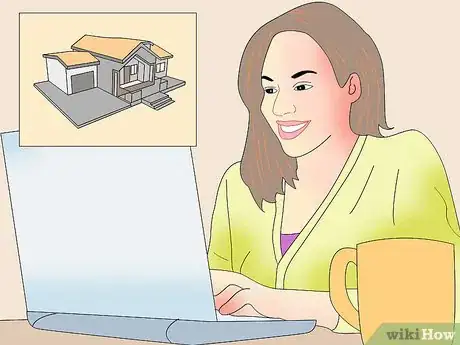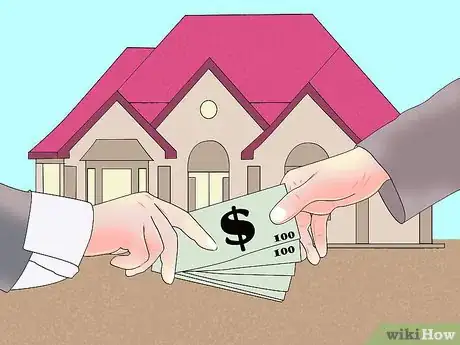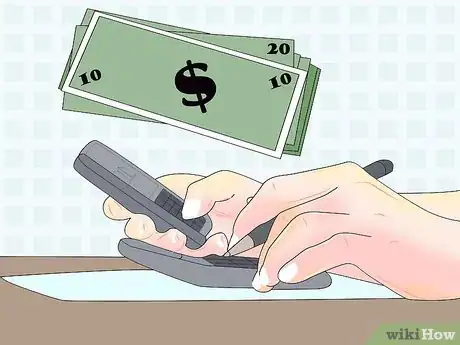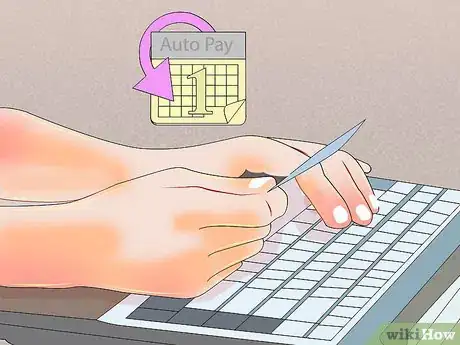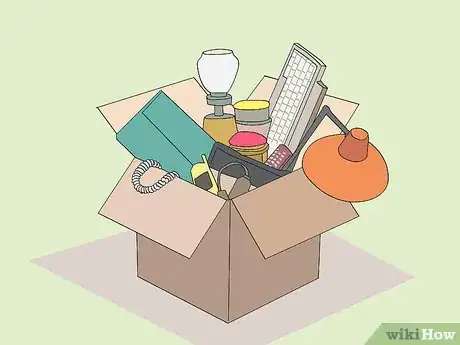This article was co-authored by Michael R. Lewis. Michael R. Lewis is a retired corporate executive, entrepreneur, and investment advisor in Texas. He has over 40 years of experience in business and finance, including as a Vice President for Blue Cross Blue Shield of Texas. He has a BBA in Industrial Management from the University of Texas at Austin.
There are 24 references cited in this article, which can be found at the bottom of the page.
This article has been viewed 17,100 times.
The typical way we earn money is to pull in a regular salary for performing a job (or two, or three). However, there are other ways that you can increase your income without taking on a second job. For example, you could develop passive income streams, make money from your hobbies, or even earn more at the job you already perform. All of these methods require some effort upfront, but they might be more fun than working overtime. And if you're successful, you can reduce the number of hours you work while earning even more money.
Steps
Making Money from Your Hobbies
-
1Ask yourself what you enjoy doing in your spare time. What are your very favorite hobbies and activities?[1] If you have a blast doing it, you won't think of it as "work," even if it is bringing in money. Think carefully about how you spend your evenings and weekends. Then think about how nice it would be if someone paid you to do what you love most. Some examples of potentially lucrative hobbies include:
- Fixing computers
- Playing music
- Photography
- Knitting or crocheting
- Woodworking
- Writing and blogging
- Painting
-
2Make a list of who might benefit from your hobby. While we think of hobbies as private affairs, there are many ways that a hobby can benefit others. Think about what kind of benefit your hobby might bring to the world, and consider whether someone might pay for the service. Some possible people who might benefit are:
- Advertisers. For instance, if you become a beauty, fashion or travel vlogger with a wide-reaching audience, advertisers and sponsors might pay you to keep generating content or give you free products to feature.
- Students. If your hobby is one that other people wish to learn, you might find someone to pay you to teach them.
- Customers. If your hobby leads to a product or service, you might find some customers who will pay for what you have made, grown, or built.
Advertisement -
3Decide to monetize your hobby. There will be some time and effort upfront, but eventually you might be able to earn extra money for doing something that you have always done for free. Remember to keep having fun with your hobby. After all, you do not want it to feel like work. Keep in mind that profits made from hobbies are still subject to taxation. Be sure to keep careful records of the money you make, and consult an accountant if you are not sure how to report your earnings. Some ways you might monetize your hobbies include:
- Sell crafts online. If you already enjoy making crafts in your spare time, why not earn some money by doing it? Whether you are a knitter, a carpenter, a paper-maker, or a painter, you might be able to find customers who are willing to pay you for what you enjoy most.
- Do not undervalue your products. Remember that your time is valuable, even if you are having fun making your crafts.[2] Make sure that your hobby is not costing you more money in the long run, and set your prices high enough to cover the cost of your supplies.[3]
- Be sure to adhere to all legal codes and tax regulations. This might be your hobby, but it is also technically a business, which means that you are responsible for ensuring that your product is safe.[4]
- Write a blog. If you already enjoy writing and blogging, consider monetizing your favorite hobby. Blogs can make money by including links to paying affiliates, using an advertising network (such as Google's AdSense), or finding private advertisers who will sponsor your content.[5]
While your hobby blog might not earn you very much advertising money, something is better than nothing.
- While there are many free blog hosts out there, some hosts cost money. Keep costs in mind if you decide to monetize your blog.
- Start a video channel. If you are an extrovert and you like to perform, perhaps you can start filming your antics and putting them online. If you can find a large audience and update consistently, you might be able to make money from your YouTube pageviews.[6] You can also earn money by partnering with corporate sponsors if you review their products.
- Grow and sell vegetables. If you have a vegetable patch that you tend, think about selling your extra zucchinis and pumpkins. Local chefs, local markets, and your neighbors might be willing to pay to get fresh, local produce instead of blander grocery store veggies.[7]
- People will be more likely to buy vegetables that look fresh and healthy. Be sure that you keep your produce cool and crisp when you transport them to your buyer.
- Sell crafts online. If you already enjoy making crafts in your spare time, why not earn some money by doing it? Whether you are a knitter, a carpenter, a paper-maker, or a painter, you might be able to find customers who are willing to pay you for what you enjoy most.
Using Real Estate as Passive Income
-
1Decide whether you have a passion for real estate. Think about how you like to spend your free time and energy. Do you enjoy talking to people? Do you like home maintenance? Do you take pride in your home? Do you like learning about new neighborhoods and property values? If so, then you might consider becoming a landlord in order to generate passive income. Note that there are financial advantages to becoming a landlord, such as tax advantages as well as upside growth.
-
2Talk to a real estate lawyer. Before becoming a landlord, you should get familiar with real estate law in your region.[8] Talk to a knowledgeable lawyer who can make sure that you abide by important landlord-tenant regulations as well as important zoning laws.
-
3Talk to other real estate owners. By talking to other landlords, you can get an inside view of the pros and cons of owning real estate. They can let you know what works for them and what mistakes they've made in the past.[9]
-
4Talk to a financial advisor. Buying a home has a huge upfront cost and is not to be taken lightly. Even if you expect to pay your mortgage with your tenants' rent, there will be additional expenses. These include: a down payment, taxes, maintenance, insurance, and cleaning fees. There might also be times when your tenants are unable to pay their rent or break their leases.[10] Consult a financial advisor who is familiar with real estate purchases. Talk with them about your financial situation and whether you can afford to take the risk of becoming a landlord.
-
5Decide what kind of tenants you want. Do you want to rent out an apartment in a student-centered neighborhood? Or do you want to rent out a duplex in a neighborhood filled with young families? Consider carefully who you want your renters to be, as well as what your ideal renter can afford. This will help you narrow down your property search.[11]
- Remember that most renters are under the age of 35, though a number of renters are middle-aged as well.[12] Keep in mind that families with kids are just as likely to rent as they are to own.[13]
- Note that students might not have as much income as older tenants. However, they might also be less picky about the aesthetics of the property they are renting which could keep your overhead lower. Consider carefully how much you are willing to spend on your property and how much rent you will have to charge in order to come out ahead.
- No matter what, the happiness of your tenant is key to growing a successful income stream through real estate.[14]
-
6Research properties in your area. Different neighborhoods have different regulations, demographics, and property values. Try to find a neighborhood that has relatively stable property values or that can be expected to have increasing property values over time.[15] Other things to consider include safety, durability of construction, proximity to appealing amenities such as schools or shops, and accessibility to public transit.
- Much of this information is available through internet searches and real estate websites. You can also read through local newspapers to get a feel for the neighborhood.
- Be sure to visit and walk around the neighborhood you are researching.[16] If you do not live in that neighborhood, you will have to find other ways to get to know the area. Go to local coffee shops, visit the library, and check out nearby bus and subway stops. Feel free to talk to neighborhood residents if you have questions about their experiences living there.
- Search current apartment listings in the neighborhood to learn what rents cost there. See if what you are planning to charge is comparable to what tenants are already paying in that neighborhood. Classified advertisements and online apartment search engines will be able to tell you whether the neighborhood is a good financial fit for you.
-
7Purchase your property. Once you have determined what you can afford and where you would like to become a landlord, make an informed purchase. Don't be too hasty, and make sure that you get the property thoroughly inspected before closing. Continuing to consult your financial advisor and real estate attorney is advisable.
- Keep in mind that rental properties can be treated differently from residences by the bank. It is likely that you will need to pay a larger down payment, more taxes and fees, and that you will have to have a larger liquid savings cushion before purchasing a rental property.[17]
- It is wise to talk to a lender who specializes in rental properties. They can help walk you through the process.[18]
- Remember that home purchases can take a long time to go through. You might also have to undertake repairs and cleaning before your building is ready for tenants. Make sure that you have enough extra money to see you through those initial hard months before the rental income comes in.
-
8Get to know prospective tenants. Make sure that any prospective tenant has a good credit rating, stable income, and is likely to pay your rent in a timely way.[19] Use an application process to make sure that your tenants are reliable and stable. You can also use a background check service to ensure that your tenants do not have a history of breaking leases or damaging property.
- Always adhere to real estate law when vetting tenants. Remember that there are some questions that you are not allowed to ask about a prospective tenant's background. Do not make hasty judgments based on race or ethnicity: only pay attention to the relevant financial details.
-
9Maintain your property. If you are handy, you can maintain the property yourself. You might also hire out contractors or use one of your tenants as an on-site property manager. Make sure that your property is in good repair and looks appealing to new tenants. Pay particular attention to your property's plumbing, roof, foundation, and insulation, and update your property if necessary.
-
10Receive your rental income each month. While it takes a lot of work to become a landlord initially, the rental income might become a stable source of passive income for the rest of your life. If you keep your property in routine maintenance, you might not have to spend much time worrying about the property at all.
Making Your Assets Work for You
-
1Invest your money wisely. Some people say that the best way to earn money is to have money. This is because wise investments are often the surest way to grow your money effortlessly. Instead of working for your money, let your money work for you. Ideally you will only spend a few minutes every month on your investments, and your returns might be huge.
-
2Invest in low-fee index funds. Index funds track the entire stock market. They are not actively managed by a fund manager, which means that their fees tend to be lower.[20] They are also less risky than short-term stocks.[21] While the returns on index funds might not be as huge as a lucky short-sell, they tend to beat inflation. They also require almost no work on an investor's part.
- You can purchase index funds that track the U.S. bond market, the international stock market, and the U.S. stock market. Many financial advisors recommend balancing your portfolio amongst these three index funds.
- These are also known as "lazy portfolios," which is ideal for someone who wants to work less while earning more![22]
-
3Automate your investments. Decide what you can afford to invest every month, and set up automated purchases to make that transaction. If you set up automatic payments, you will not have to think about your investments at all: your money will simply accumulate.
- You can also decide whether you want to reinvest any dividends (or profits) you receive, or whether you would like your dividends to be paid to you directly. If you would like more money in the long-term, you should reinvest your dividends. If you require more cash in the short-term, you might wish to receive your dividends in cash.
-
4Ignore stock market rises and falls. Many investors panic during stock market crashes and feel overconfident during stock market rises. However, it is much better for your earnings to buy low and sell high. Ride out any stock market rises and falls with confidence. If you continue investing in index funds, you will likely come out ahead despite any short-term losses. Allow your money to keep working for you so that you can work less.
-
5Sell unwanted belongings. Rather than throwing out your junk, you should consider selling your objects to someone who might treasure them.[23] You will have the benefit of cleaning up your living space at the same time that you earn money. Some easy ways to sell your belongings quickly include:
- Putting up a classified ad. You can use your local newspaper or an online classifieds website like Craigslist to describe the items you want to sell.[24]
- Setting up an online store. Through large online retailers such as eBay or Amazon you might be able to sell items such as used books, your old baseball card collection, or even your clothing that no longer fits.
- Taking your unwanted clothing to a consignment shop. Especially if you have designer items in good condition, you can make a few bucks with a quick trip to your local consignment store.
Working Less and Earning More at Your Workplace
-
1Ask for a raise. The simplest way to earn more is to ask that your pay increase.[25] You will be more successful if you can make a good case why you should earn more. Ask for a raise after a positive performance review, after you've landed a great client, after you've gotten a job offer elsewhere, or after you have earned an additional certification. Do your research about what employees at your level are earning, and use your research to determine how much more money you will ask for.
-
2Renegotiate your work schedule to increase productivity. Track when you are feeling most energized and when you are feeling sluggish. Rearrange your schedule so that you complete your most difficult tasks during the optimal times. Use the sluggish part of your day to do mundane, routine tasks.[28] This will help you be more productive at work, and potentially work fewer hours.
-
3Complete similar tasks at the same time. Batching your tasks will allow you to remain in the groove and finish each task more quickly. Structure your time effectively and efficiently, and perform similar tasks all at once.
- For example, take care of your emails all at once instead of one at a time throughout the day. Scattering your email replies over several hours will distract you from your other tasks.
-
4Give yourself shorter deadlines. Deadlines are an effective way to combat procrastination and make your work hours count. Deadlines are even more effective when they are imposed by external factors.[29] Give yourself tight but realistic deadlines, and try to complete tasks more quickly. The more efficient you are at work, the more quickly you can go home for the day.
Warnings
- Always follow the law in your money-making practice. Consult an accountant or attorney if you are unclear about how the laws apply to you.⧼thumbs_response⧽
- Keep in mind that all investments pose some kind of risk. Decide how much risk you are willing and able to take on before making any large purchase.⧼thumbs_response⧽
- Avoid get-rich-quick schemes. They are more likely to cost you money than make your money.⧼thumbs_response⧽
- Beware of multi-level marketing (in which you make money by recruiting other salespeople to join your team) or direct sales companies (in which you sell retail goods as an independent seller, away from a store). Some are more legitimate than others. Make sure you do not have to invest much money upfront and that your company is willing to buy back unsold merchandise. It is a big red flag if they have steep financial penalties for unsold goods.[30]⧼thumbs_response⧽
References
- ↑ http://www.goodfinancialcents.com/hobbies-that-make-money
- ↑ http://www.telegraph.co.uk/finance/personalfinance/money-saving-tips/11166974/I-quit-work-to-sell-my-crafts-online-and-net-20000-salary.html
- ↑ http://usatoday30.usatoday.com/money/smallbusiness/columnist/abrams/story/2012-08-24/small-business-making-money-with-crafts/57250528/1
- ↑ http://www.telegraph.co.uk/finance/personalfinance/money-saving-tips/11166974/I-quit-work-to-sell-my-crafts-online-and-net-20000-salary.html
- ↑ https://blog.mint.com/how-to/7-ways-to-make-money-from-blogging-0513/
- ↑ http://www.theguardian.com/education/2014/oct/10/-sp-could-you-be-a-star-blogger-vlogger
- ↑ http://www.theguardian.com/money/2013/jul/26/making-money-allotment-gardeners
- ↑ http://money.usnews.com/money/personal-finance/articles/2013/11/04/what-you-should-know-before-becoming-a-landlord
- ↑ http://at.progressive.com/everything-insurance/the-landlord-decision
- ↑ http://www.styleathome.com/homes/real-estate/rental-properties-8-things-to-know-before-becoming-a-landlord/a/38881
- ↑ http://www.telegraph.co.uk/finance/property/property-club/9870977/ten-tips-how-to-become-landlord.html
- ↑ http://www.jchs.harvard.edu/sites/jchs.harvard.edu/files/jchs_americas_rental_housing_2013_1_0.pdf
- ↑ http://www.jchs.harvard.edu/sites/jchs.harvard.edu/files/jchs_americas_rental_housing_2013_1_0.pdf
- ↑ http://www.interest.com/real-estate/news/7-smart-moves-for-getting-started-landlord/
- ↑ http://www.cbsnews.com/news/become-a-rich-landlord-in-7-simple-steps/4/
- ↑ http://www.interest.com/real-estate/news/7-smart-moves-for-getting-started-landlord/
- ↑ http://www.cnbc.com/id/41782070
- ↑ http://homeguides.sfgate.com/buy-house-specifically-rent-out-profit-60230.html
- ↑ http://time.com/money/2800666/thinking-about-becoming-a-landlord-avoid-these-6-rookie-mistakes/
- ↑ http://money.usnews.com/money/personal-finance/mutual-funds/articles/2015/04/06/great-index-funds-for-a-dirt-cheap-portfolio
- ↑ http://www.cnbc.com/2014/11/06/investors-flocking-into-index-funds-heres-why.html
- ↑ https://www.bogleheads.org/wiki/Lazy_portfolios
- ↑ http://www.consumerreports.org/cro/money/shopping/shopping-tips/best-ways-to-sell-your-stuff/overview/index.htm
- ↑ http://www.consumerreports.org/cro/money/shopping/shopping-tips/best-ways-to-sell-your-stuff/overview/index.htm
- ↑ http://www.carefulcents.com/earn-more-and-work-less/
- ↑ https://hbr.org/2015/03/how-to-ask-for-a-raise
- ↑ https://hbr.org/2015/03/how-to-ask-for-a-raise
- ↑ http://www.carefulcents.com/earn-more-and-work-less/
- ↑ http://www.ncbi.nlm.nih.gov/pubmed/12009041
- ↑ http://www.cbsnews.com/news/tupperware-avon-and-more-4-questions-to-ask-about-direct-sales/








